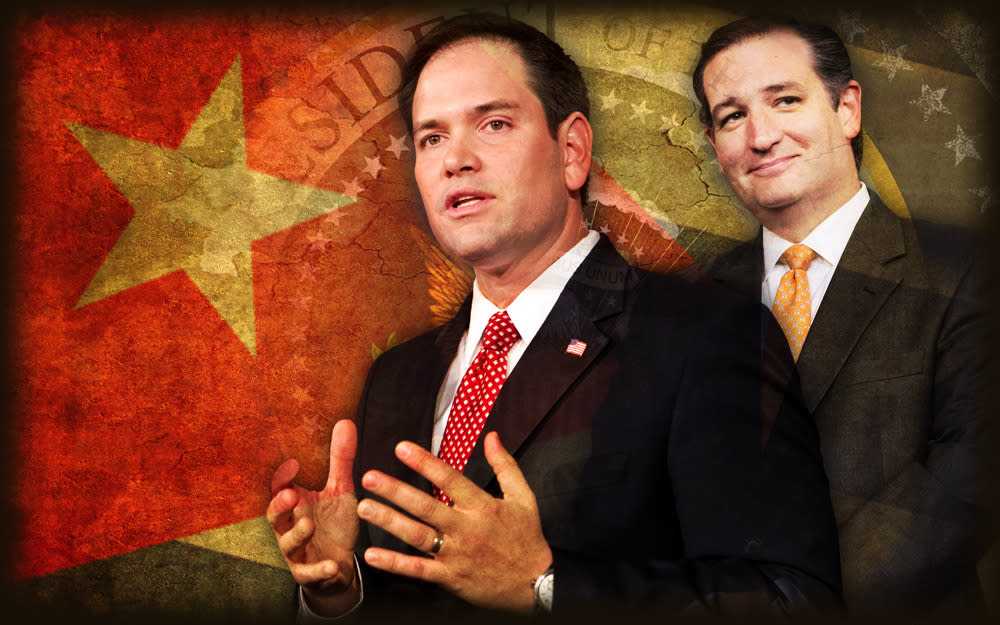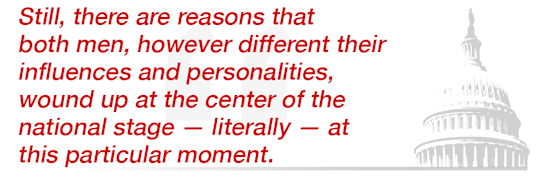Cruz and Rubio, two sons of Cuban parents, are vying to lead the anti-immigrant party

Photo illustration: Yahoo News; photos: AP, Getty Images
There’s nothing new about seeing a group of presidential hopefuls who are the grandchildren of immigrants — Irish, Italian, Czech, German — decrying the burden of rampant immigration. Seldom, it seems, are the candidates who rail loudest against interlopers the ones whose ancestors walked off the Mayflower.
What is unusual, though, is to turn on a presidential debate and see two notably young Latino candidates, both born to Cuban émigrés, jockeying over who will close the border faster and more securely. That was the scene in Las Vegas Tuesday night, and it underscored a central paradox of this year’s Republican contest: Both Ted Cruz and Marco Rubio seem like decent bets now to become the first Latino nominee in either party’s long history, at exactly the moment when anti-immigrant fervor is reaching its zenith.
Which tells you something about the singularity of the Cuban-American experience, but maybe also about some of the nuance we tend to overlook in the immigration debate.
It’s tempting to see Cruz and Rubio as politicians cast from the same mold and reflecting remarkably similar stories. Here are two 44-year-old conservative Cuban-Americans, both lightning fast from mind to mouth, both first-term senators who capitalized on voter rebellion — Rubio in 2010, Cruz two years later — to shock establishment-backed opponents. The parallels are kind of bizarre.
Both men, eyeing the presidency from the moment they arrived in Washington, also wrote readable, if thoroughly forgettable, political memoirs with the kind of anodyne titles that make you think there must be some publishing algorithm for coming up with this stuff: “A Time for Truth” in Cruz’s case, “ An American Son” in Rubio’s.
But if you read through those accounts (I have, mostly, so you don’t really need to), you can see a subtle yet defining difference in each man’s out-of-Cuba narrative, which probably has a lot to do with making them very different kinds of politicians.
Cruz’s father fled political repression and existential danger as an ally of communist rebels seeking to overthrow Fulgencio Batista. Once in America, Rafael Cruz grew disillusioned with Fidel Castro and threw communism overboard, replacing it with a new guiding cause: evangelical Christianity.
Rubio’s dad, on the other hand, came to America chiefly in pursuit of economic opportunity. In Florida and then in Nevada, and then back in Florida again, Mario Rubio’s passion was to provide for his family, running small, ill-fated businesses (a vegetable stand, a dry cleaner) and tending bar.
Politicians, of course, have a tendency to reverse-engineer their memoirs, creating stories that neatly support their campaign themes; it can be hard to tell whether their experiences forged their worldviews or the other way around. Even so, in both of these immigrant stories, you can detect the roots of different political personas.
Cruz’s Cuban story is all about zealotry and purity — a journey of faith, both political and religious. The boyhood chapters of Rubio’s memoir, on the other hand, are largely about paying bills and fitting in, as generations of immigrants have tried to do — playing football and celebrating American holidays, switching churches (Catholic and Mormon) in order to adapt to social circles.

And this may explain, to some extent, why Rubio wore the mantle of the tea party but never really aspired to it, working to transform himself, instead, into a more traditional kind of senator and party leader. Cruz, on the other hand, came to Washington and immediately sought to rally conservative congressmen against their own leadership’s ideological malleability, as if gathering up guerrillas in the jungle.
Still, there are reasons that both men, however different their influences and personalities, wound up at the center of the national stage — literally — at this particular moment.
Because of Cuba’s outsize role for a tiny island in the geopolitical drama of the Cold War and in American politics, Cuban-Americans have always seen themselves, perhaps more than any other immigrant group, as instruments of destiny. The most common narrative among Cuban-Americans revolves around all the wealth and greatness that would have been theirs save for the scourge of global communism.
“If you put together all the sugar plantations Cubans have claimed to have once owned,” jokes Joe Garcia, a Cuban-American Democrat who represented the Miami area in Congress, “you’d have a country the size of Brazil.”
It’s a dubious narrative in many cases, but it has fueled intense political activism among Cuban-Americans, whose experience has always made them lean more conservative than other Latino groups. As the children of revolution-era émigrés begin to enter middle age, it’s not surprising that the most talented among them would reach the highest echelons of Republican politics at the same time.
What’s harder to explain is why a party so steeped in anti-immigrant fervor at the moment would embrace both Cruz and Rubio more than almost any of its older, whiter candidates. Or to put it another way: The largest bloc of Republican voters at the moment seems to prefer the TV celebrity Donald Trump, with his passion for excoriating foreigners and his promise to close us in behind a gargantuan wall, but after that, they’re most inclined toward two Latino senators they might barely recognize on the street.

Maybe this suggests that conservative anxiety about immigration isn’t principally about race or even xenophobia, as critics on the left always assume it is. Rather, it’s about insecurity — the fear that deteriorating borders are leading businesses to flee and downtowns to shutter, that there aren’t enough jobs for everyone who wants to live here, that streets aren’t safe and the bonds of common culture are fraying.
What Trump and other Republicans have hit on — and one needs no proverbial dog whistle to hear it — is the idea that we can’t protect what’s ours, which makes us less inclined to share it.
And this leads a lot of Americans, not so far removed from their own families’ journeys through Ellis Island, to embrace a kind of strange duality. We love the immigration story, but not so much the immigrant. We understand that immigration is essential to the American identity, but we don’t see much evidence of it making us safer or more prosperous now — especially when so much immigration seems to happen outside the law.
What Cruz and Rubio do is to reconcile this contradiction. Like President Obama before them, simply by existing as credible, compelling candidates, they testify to our faith in the ideal of an America that rewards talent and toil, from anyplace and in any color. But in their conservative rhetoric, they also acknowledge the distance between that inspiring ideal and the bleaker reality that now preoccupies a lot of frightened white voters.
And maybe if you’re Cruz or Rubio in this moment, a Cuban-American carried to Washington atop a tsunami of voter discontent, this is the thing you understand — the balancing act required to become the nation’s first Latino president. It’s not so much about forgetting where you came from, but rather remembering where we are.



